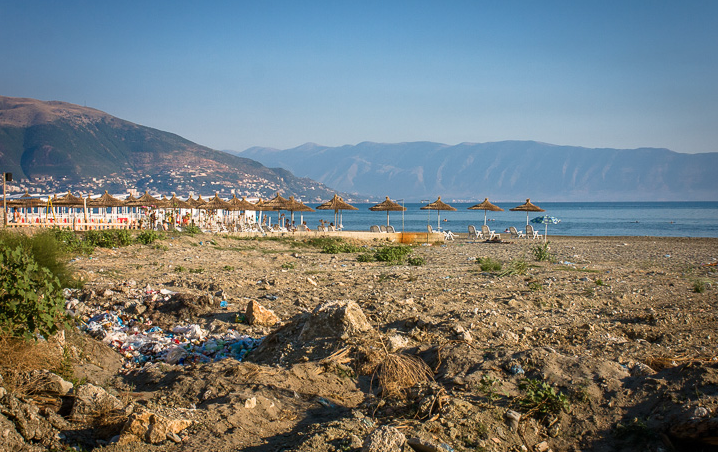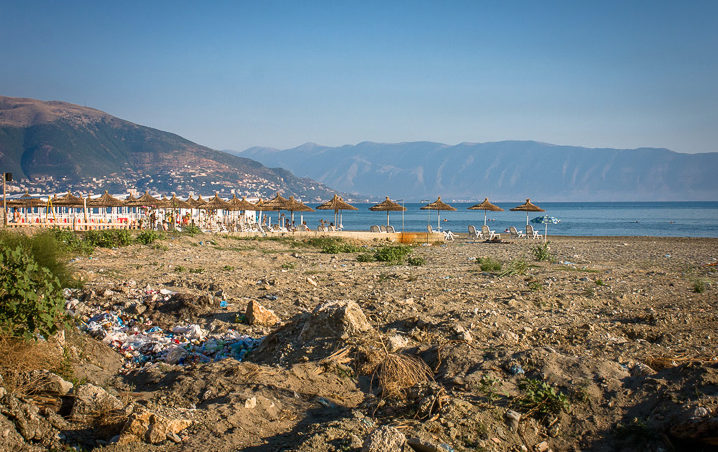One of the most acute problems of environmental degradation on the coast is caused by urban waste. This issue, along with the problem of sewage are still unresolved and alarming.
Waste is collected near rivers, streams and near the sea. Their deposits go to landfills but these are out of standards, unplanned and located in inappropriate places.
The problem of waste management inherited from 30 years, has recently been in the special attention of the Prime Minister, who has undertaken a coordinated campaign with the local government that aims to clean the territory before the touristic season. Furthermore, the Government has drafted a plan that aims to provide proportion support to the needs of each of the Municipalities.
During the study on mapping the most acute environmental issues along the coast in Albania conducted by EcoAlbania with the support of the Westminster Foundation for Democracy, the perception of various actors was evaluated in the coastal region, including Local Government Units, various agencies, academic sector, private sector and CSOs. In particular, the lack of a landfill on the coast and the lack of waste recycling have been assessed as the major problem across the coast. However, this problem is perceived as quite essential by the local actors of the city of Durrës who evaluate it with 3.63 points out of 4 possible while in Lezha with 3.83 out of 4 points.
Urban solid waste and sewage management requires a new management system, as well as an institutional control through environmental inspectorates. However, in order for the model to be fully effective, it must be extended to rural areas of municipalities. Municipalities have local waste management plans but have not yet been able to provide a proper strategy for their recycling and disposal.

Another aspect is that Vlora for example, has great potential for development in tourism, but unfortunately the Adriatic beach already has 7 canals of used water. On this beach, even the signs indicating the presence of these waters, have been removed. For this, the municipality of Vlora is at the end of the process of wastewater and urban waste plants which are expected to be put into operation in March 2022. In addition, the Municipality has provided new rules for waste collection and their division by categories. Specifically, every year in Vlora 122,463 tons of waste is collected and these are not classified when they go to landfill, a process which increases the time of their recycling. In other words, the city of Vlora produces 76.9% of waste in its entire region.
According to the study, a recommendation for the municipality of Vlora is related to the need for a special working group in order for the municipality to provide statistics on how much waste goes to the landfill since the public cleaning actions have not been enough. In recent years there have been very few legal initiatives by the CSO-s to propose changes. Cleaning actions are not a permanent solution to the problem, but only serve to raise awareness among citizens. Therefore, the increase of local capacities regarding the control, management and inspection of waste in the coastal zone is in the plan of the Municipality of Vlora.
To mention the Municipality of Lezha, a feasibility study is being conducted for urban waste, to stop their volume through the Drin riverbed. In a discussion with the representatives of local institutions of Lezha, conducted on December 14, 2021, was emphasized the need for the implementation of a cleaning process of urban waste in this river. This process would also improve the conservation of the ecosystem in the Kune-Vain lagoon.
While in the municipality of Durrës, in the delta of the river Ishëm, is noticed the presence of hospital waste, while in Spille this waste is burned in nature. Despite the fact that the landfill of waste in Manez is estimated by local actors with 24%, this is insufficient given the high numbers of waste. Due to their inefficient management, the waste will be transferred to the other landfill of Sharra, but with the new initiative by the municipality of Lezha these wastes will be differentiated before ending up in this landfill.
During the discussions on environmental issues on the coast, it was concluded that the processes of restructuring and reviewing the plans of the Municipalities, are often done in a hurry and without being acquainted with the scientific conclusions and suggestions of stakeholders. In this way was recommended a consultation process between stakeholders, science and decision-making with local institutions in Vlora, Durres and Lezha and CSOs in coastal urban planning processes.








